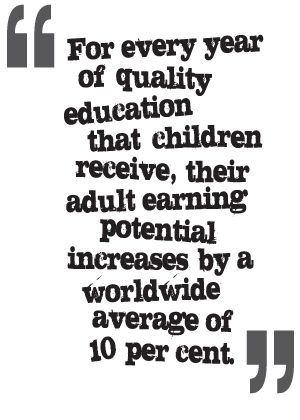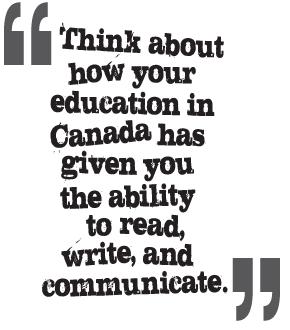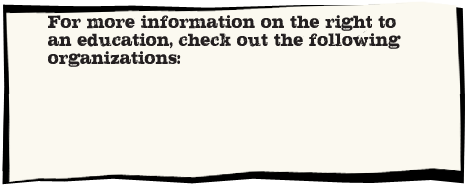
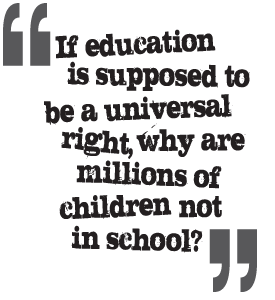
One hundred and fifteen million!
 That’s the number of elementary school children in the world who are not in school. I was stunned when I read that statistic on UNICEF’s Website, especially since the Universal
Declaration of Human Rights states that everyone has the right to an elementary school education. I asked myself, if education is supposed to be a universal right, why are millions of children not in school?
That’s the number of elementary school children in the world who are not in school. I was stunned when I read that statistic on UNICEF’s Website, especially since the Universal
Declaration of Human Rights states that everyone has the right to an elementary school education. I asked myself, if education is supposed to be a universal right, why are millions of children not in school?
Poverty & Child Labour
In many countries, such as Kenya, Liberia, Ethiopia, Nigeria, Sudan, and India, parents struggle daily to feed and clothe their family. They often keep children out of school so they can work and contribute to the family's income. Ten-year-old Amna from Sudan had to stay home and help her mother with household chores and tend to her family's camels. School wasn't a priority for her when there were mouths to feed and bodies to clothe.
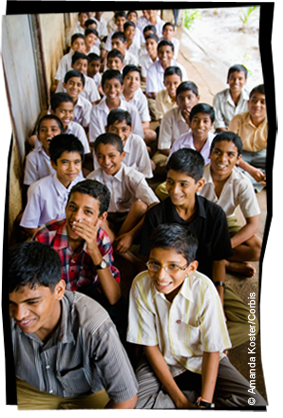
Discrimination
If there is money for school, parents will often choose to send the son instead of the daughter, as they believe the boy will be the best return on investment. A boy will be more likely to find a good-paying job after graduation, and therefore contribute more to the family’s income.
In many poverty-stricken countries, girls are expected to stay at home to care for younger siblings, to cook, to clean, or to work at low-paying jobs to contribute to the family's income. Girls are also expected to marry early (sometimes as young as 12 years old!) and begin having children by 14 or 15.
Safety
For some students, getting to class is not as easy as boarding a school bus or riding a bike. In times of war, armed conflict, and political unrest, students may encounter terrifying and deadly situations every day on their way to school. Children run the risk of being captured and forced into child armies and girls are threatened with sexual violence. In 2002, the International Programme on the Elimination of Child Labour estimated that the number of children involved in armed conflicts had increased to about 300 000 over the past decade.
Some children also need to worry about stepping on land mines on their way to school. A group of mothers in Sudan were so determined to make it safe for their children to walk to school, they took it upon themselves to clear the path of land mines.
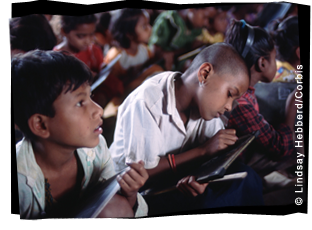 Why This Must Change
Why This Must Change
According to research done by Free The Children, education is the most important factor that will end child labour. Children who attend school are less likely to be involved in hazardous or exploitative work. They are also more likely to break out of the vicious cycle of poverty. UNICEF says that for every year of quality education that children receive, their adult earning potential increases by a worldwide average of 10 percent.
In addition to teaching the basics like literacy and numeracy, schools can educate all children (especially girls, who tend to be responsible for the health and welfare of the younger children in the family) about health, nutrition, hygiene, and family planning. This could go a long way to halting preventable diseases, such as HIV/AIDS and cholera. These children go on to make better-educated decisions on how to care for their family. Their education also leads to well-paying jobs, which can then lead to big improvements in their communities.
You and I Can Make a Difference
After reading that statistic—115 million elementary school children in the world not in school!—I knew I needed to do something. I wanted to make a difference.
First of all, I got great tips from the UNICEF Canada Website on how to start fundraising in my neighbourhood. I approached my local community centre and got permission to hold a dance-a-thon and a car wash to raise money. We donated the money we raised to a registered charitable organization that specialized in getting kids back to school.
I also asked the principal at my high school if I could present a two-minute speech at curriculum night to help raise awareness. It was a huge success, and now I’m helping kids at my school create a blog about the right to education.
|
Think about how your education in Canada has given you the ability to read, write, and communicate. Then think about how you can use these skills to ensure that children around the world have the chance to do the same. It’s time to stand up for those children who don’t have their rights!
